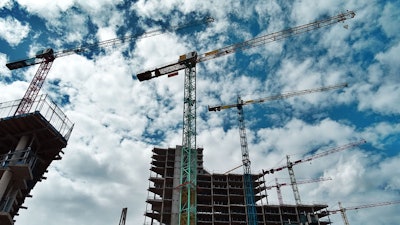
Many parts of the country and all over the world are experiencing climate change. These changes in weather are and will continue to have a prominent effect on the construction industry and on the construction jobsite.
ForConstructionPros.com spoke to Dr. Sergey Sundukovskiy about the impacts of climate change on the construction industry and what contractors need to do to protect their jobsites, companies and workers from climate change.
ForConstructionPros.com: We’ve all heard the term “climate change,” but can you explain it and how it pertains to the construction industry?
Sergey Sundukovskiy: "Climate change" in common usage has come to replace the term "global warming," which in a linguistic manner has not accurately described observed weather conditions. Climate change describes the conditions where global climate variations exceed the norm.
Specific climate change conditions that have an effect on the construction industry have to do with both climate amplitude and duration. For instance, extreme hot or cold conditions may require additional specialized equipment resistive to such conditions resulting in cost overruns. Also, from the temporal point of view, such conditions may last much longer than they normally do — for instance, over 100-degree heat for 90 consecutive days. As such, field workers might have to be changed out more often or the work would have to be performed during a different shift resulting in slowdowns and additional labor expenses.
Additionally, climate change impacts may be felt in the reduction of the days when the construction is feasible altogether. This is usually the case when construction projects are performed in the difficult to reach areas; such is often the case during gas and oil exploration and pipeline construction. These projects depend on the equipment and construction materials to be delivered over permafrost or unpaved roads. Unseasonably warm conditions can make unpaved roads or the roads built over permafrost impassable.
ForConstructionPros.com: Why should the construction industry be concerned about climate change?
Sundukovskiy: As weather variations become too extreme, their impact gets amplified. The construction industry has one of the lowest profit margins when compared to other major industries. Even slight variations in weather, beyond expected conditions, might render construction projects unprofitable.
There are primarily four concerns around climate change in terms of greatest impact on the construction industry:
- Worker safety
- Weather-related delays
- Construction materials design and manufacturing
- Insurance costs
Excessively hot or cold weather conditions and exposure to these conditions are resulting in increased worker compensation claims and subsequent project delays. Additional instances related to climate change may include uncharacteristically strong wind conditions that result in injury due to falling or being hit by construction debris.
The estimated cost of weather-related delays in the United States alone approaches $4 billion. Some specific examples include excessive rains turning mud or shallow water into deep water. Conversely, excessively dry conditions, on many occasions, make it impossible to begin foundation work on the jobsite. In extreme cases, consecutive weather delays of 30 days or longer may result in missing acceptable construction season entirely, which could require shifting completion into the following years.
Climate change is driving significant change in construction material composition and manufacturing. Increasingly stronger, lighter and more durable materials are required, which drives the cost of materials up. Those costs will eventually need to be borne by the construction companies.
Lastly, construction companies increasingly find themselves facing increased insurance costs due to project delays, which are related to extreme weather and (perceived and actual) labor risks. This means construction companies need to increase the cost of the project to cover rising insurance costs or stop pursuing certain construction projects due to an inability to afford insurance.
ForConstructionPros.com: What are some things construction contractors can start doing now to safeguard against impacts of climate change?
Sundukovskiy: Most construction companies have not fully come to grips with the impact of climate change. Those that have try to account for inclement weather by including additional contract stipulations and indemnifications. For example, ConsensusDOCS - §6.3 includes a stipulation for delays and extensions of time that, among others, calls out ‘adverse weather conditions not reasonably anticipated.’
Additional changes include overall project price increases that are passed on to the project owners while cost compression for any work is passed on to subcontractor companies. A construction company might pass on a multi-year project due to unpredictable weather conditions or take much longer in the RFP process and bid estimation.
ForConstructionPros.com: How can the construction industry use technology to deal with impacts of climate change?
Sundukovskiy: Since climate change is not something construction companies can control, they are turning their sights to other aspects of construction that can be controlled through the use of technology. Construction companies are starting to utilize construction applications to keep track of time, materials and equipment. More importantly they keep track of labor, materials and equipment profitability based on estimated vs. actual profitability.
Using technologies to keep track of time, materials and equipment relates to climate change in both a direct and indirect way. Indirectly, the use of technology contributes to the reclaiming of the operating margin otherwise lost to the extreme weather conditions. However, more importantly, construction technology helps quantify weather-related impact. Climate change is easily felt but not easily quantified. Using technology to track delays, additional equipment and materials needed to mitigate for the inclement weather would provide such quantification.
Additional use of technology related to climate change centers on worker safety. Construction companies increasingly use technology for conducting job safety/job hazard briefings ahead of possible weather flare-ups.
ForConstructionPros.com: What is the benefit of automatic weather capture? Why should construction contractors be doing this now and into the future?
Sundukovskiy: Automated weather capture is one of the key benefits of technology we have not examined. Both weather capture and weather forecasting are essential to keeping construction projects on time and on target. They provide a more accurate explanation of potential project delays and can help protect from litigation. Technology applications that offer weather capture and forecasting are very much in demand since they allow seamless documentation of the present weather conditions and the substantial look-ahead of weather conditions to come. Increasingly accurate and longer look-ahead forecasts allow construction companies to take corrective actions either by rescheduling or conducting toolbox talks and job safety/hazard briefings.
Construction field management platforms often use multiple third-party weather services such as OpenWeatherMap, Yahoo Weather, Weather Underground, Forecast.io., etc. These services are integrated via Application Programming Interface (API) and provide current, five-day by the hour and up to 14-day daily weather forecasts. These forecasts get captured for historical and comparative purposes and remain persistent for the lifetime of the daily reports.
Dr. Sergey Sundukovskiy is co-founder of Raken. Before Co-Founding Raken, Sundukovskiy served in capacities of Chief Technology Officer, Chief Information Officer and Chief Product Officer. Sundukovskiy is a serial entrepreneur co-founding multiple successful Startups focused on Small Business Marketing and eCommerce. Sundukovskiy specializes in the implementation of subscription based high volume SaaS platforms, with strong emphasis on early stage product development, product marketing and customer acquisition. Sundukovskiy has a B.A. in Computer Science from the University of California, San Diego, M.S. in Information Technology from the University of Liverpool, and Ph.D. in Information Technology Management from the School of Business and Technology, Capella University.



















